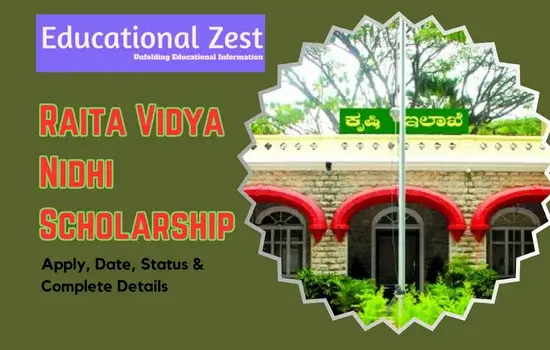The introduction of the Raita Vidya Nidhi Scholarship by the Government of Karnataka can be seen as a very good step in a country where due to financial problems, most families having any connection with agriculture really struggle to offer quality education to their children. The program provides scholarships to the children of farmers and it reduces, to that extent, the burden on the farming family to educate their children. This paper emphasizes the key details of this scholarship program. They include objectives, eligibility, and necessary documents. This also covers the application process and ways to find out if an applicant has been accepted or not.
About Raita Vidya Nidhi Scholarship

Raita Vidya Nidhi Scholarship Scheme removes financial barriers for farmer’s children’s higher education. This scheme offers Rs 2500–Rs 11000 scholarships to address education accessibility. The program pays scholarship payments directly into participants’ bank accounts via Direct Benefit Transfer (DBT), eliminating intermediaries. The system educates the next generation to advance individual and societal growth. Investment in farmers’ children’s education sows transformation that may benefit society. Raita Vidya Nidhi Scholarships influence more than academics. Studying and learning promotes creativity, entrepreneurship, and social growth. Education may help scholarship recipients improve their communities via agricultural innovation, community development, and other ways.
Date:
The application date for this scholarship for the year 2024 is yet to be announced.
Eligibility Criteria
Radha Vidya Nidhi Targeted criteria determine scholarship eligibility. First, contenders must be permanently present in Karnataka, relate the plan to state development objectives, and finance local communities. Residence requirements provide beneficiaries a sense of ownership and belonging, boosting their commitment to the region and its health.
The applicant’s father must farm, stressing the scheme’s support for agricultural families and children. Farmers are vital to the agricultural sector, and this criterion helps them afford child education.
Passing the 10th-grade exam from a central or state-board-accredited school signifies academic success and college readiness. The strategy maximizes its investment by choosing academically competent youngsters to become leaders and contributors.
Required Documents
Candidates for the Raita Vidya Nidhi Scholarship must present proof of eligibility. These documents are necessary for applying for and granting scholarships.
- First, applicants must show an Aadhar card, voter ID card, or other government-issued ID. This checks the applicant’s identity and avoids fraud.
- The scheme’s eligibility conditions include Karnataka residency proof. A utility bill, ration card, or other government-issued document may be utilized.
- For easy identification and processing, applications need passport-size photos. For best application and scholarship payout communication, include a valid cellphone number.
- Direct Benefit transfer requires a bank passbook to transfer scholarship money to the applicant’s bank account. Financial transactions become transparent and efficient.
- Scheme eligibility is confirmed by the applicant’s father’s farmer ID card. This checks the applicant’s family background and ensures scholarship delivery.
- To prove academic eligibility, provide the class 10th mark sheet. The applicant’s academic achievement and college readiness are revealed.
- The applicant’s age eligibility for the prize must be verified by a birth certificate or other government-issued document.
The scholarship program administrators may request more documents to verify application requirements. These exams ensure the application process is fair and effective, helping deserving applicants succeed.
Application Process
The Department of Agriculture, Government of Karnataka’s website (https://raitamitra.karnataka.gov.in/english) makes applying for the Raita Vidya Nidhi Scholarship simple. Follow these steps carefully to navigate the application process and ensure scholarship eligibility.
- Apply on the Department of Agriculture, Government of Karnataka website first. The ‘Scholarship Program for Farmer Children’ is available online. The Raita Vidya Nidhi Scholarship helps rural children get an education.
- The Raita Vidya Nidhi Scholarship is available under the ‘Scholarship Program for Farmer Children’ section. This links to the scholarship program’s online application.
- Based on preference and availability, applicants must submit their Aadhar or EID info here. This step verifies applicant identification and supports government attempts to simplify and prevent fraud.
- After that, applicants fill out the online form. This includes biographical, educational, contact, and other relevant data. Identification, residence, class 10th mark sheet, farmer ID card, bank passbook photocopy, passport-size photo, and proof of age are also required. Uploads check application legitimacy and completeness.
- Check data accuracy and completeness before submitting. To avoid inconsistencies and errors that impede application performance, this step is crucial.
- Candidates may apply online after validating all information. Submissions are confirmed via email or message.
Status Check
Candidates may track their scholarship application after applying. Click ‘Student Login’ on the Karnataka Department of Agriculture website.
To safely log in, candidates must submit their user ID, password, and captcha code at the ‘Student Login’ gateway. Candidates may monitor their scholarship application and obtain processing updates after signing in.
Radha Vidya Nidhi Following these easy steps, scholarship hopefuls may apply effortlessly. Candidates may watch their scholarship application’s progress, fostering transparency and accountability.
The Raita Vidya Nidhi Scholarship is a ray of hope for all these children of the farmers of Karnataka, who wish to study for higher education and establish their future. The scheme doesn’t only accept individual students to break the financial barrier and go for higher education, but it also empowers the state with the socioeconomic development of the country. It is true that this scholarship is not only easy to reach. However it is true to the aspirants about the methods of verification of the status—conforming to the principles the government is upholding on inclusive growth and equal opportunities for everyone.